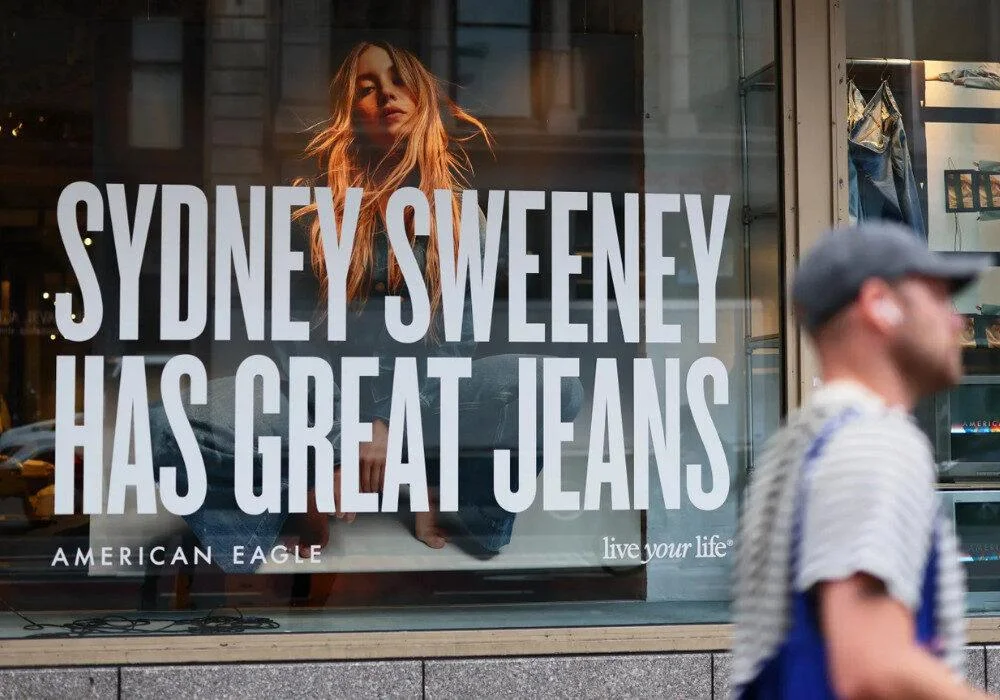The American Eagle ad was supposed to be simple. Denim. A starlet. A pun. ‘Sydney Sweeney has great jeans.’ Jeans/genes. Get it? It’s the kind of marketing meeting high-five that feels clever under fluorescent lights. Cut to: Sydney, blonde and blue-eyed…‘genes’ into ‘jeans.’ Cut to: Sydney, explaining genetics with the monotone of an old educational reel. ‘My jeans are blue.’ Wink.
Except the world outside that meeting room isn’t as simple. And this is why.
The backlash wasn’t just about a clumsy pun. It was the sound of a collective wince – a reaction to the startling lightness with which a billion-dollar brand toyed with sparks it didn’t seem to realise were already catching in a dry forest.
Read More: Bobba Faces Backlash After Simu Liu Calls Out Cultural Appropriation On Dragons’ Den
View this post on Instagram
The Kindling
It started with the visual grammar. The blonde hair. The blue eyes. The prolonged shots that felt less like selling jeans and more like cataloguing idealised Eurocentric features. Then the script: ‘Genes are passed down from parents to offspring, often determining traits like hair colour, personality and even eye colour.’ Followed by the punchline: ‘My jeans are blue.’ The Brooke Shields reference – once a touchstone of uncomfortable sexualisation – landed not as a warm nod to pop culture past, but as a grim echo in a different era. An era where ‘good genes’ is a phrase steeped in the toxic rhetoric of eugenics – a phrase championed by white supremacists, whispered by incels, and chillingly echoed in the speeches of powerful men discussing immigrants and ‘bad genes.’
American Eagle saw a pun. A large portion of the internet saw a dog whistle. Not because they were imagining it, but because they hear those whistles every single day – in policy debates, in hate speech online, in the casual dehumanisation simmering just beneath the surface of ‘polite’ society. To see it repackaged as a sexy denim ad felt less like naivety and more like insult.
View this post on Instagram
The Spark: Sydney Sweeney, Lightning Rod
Sweeney didn’t ignite this fire, but her presence poured gasoline on it. She sits at a strange cultural crossroads: an HBO starlet praised for her breakout performances and Emmy nominations, yet simultaneously reduced online to her body and politicised against her will. Her family photos featuring MAGA hats (dismissed as ‘ironic costumes’), her name appearing in Florida GOP registration databases, her branding deals with hyper-masculine, ‘country’-adjacent products – all fed into a narrative the right was eager to claim: the anti-woke blonde bombshell. Her sexuality, once the subject of feminist discourse on ‘Euphoria,’ was weaponised by conservatives to attack what they framed as ‘liberal prudery.’ Her very existence became contested ground.
So, when she stood there, representing the literal visual ideal of ‘good genes’ in an ad playing with that exact phrase, the context wasn’t just denim – it was the full weight of the ongoing culture war. For the left, it read as the normalisation of dangerous ideology wrapped in commerce. For the right, it became a rallying image – a ‘hot’ rejection of ‘woke’ hypersensitivity, even earning public nods from Trump himself. Sweeney became less an actress than a symbol on the front lines of a battle American Eagle pretended wasn’t raging just outside their storefront.

The Firestorm: Why 9% Matters
The 9% drop in foot traffic is more than a statistic – it’s a clear jolt. It’s women, queer folks, and people of colour. It’s the sound of wallets snapping shut because shopping there suddenly feels…uncomfortable. Complicit, even. Not because everyone believed the ad was deliberate Nazi propaganda, but because it revealed a staggering, offensive lack of awareness. A lack of care. A willingness to toy with imagery and language that cut deep for many, all for a cheap pun and a spike in engagement metrics.
The defense – ‘It’s just about jeans! Fun! Self-expression!’ – fell flat because it dismissed the weight of the symbols they played with. It ignored the reality that for many, ‘good genes’ isn’t a joke; it’s a threat embedded in the history of systemic injustice. And it overlooked the fact that in 2025, with fascism speaking more openly and rights being stripped away, dabbling in this kind of iconography isn’t edgy – it’s dangerous.
View this post on Instagram
Choosing The Bear: The Unbearable Context
The ‘bear’ hypothetical comes from a thought experiment about trust and safety: if you see a bear in the distance, you know you’re in danger; if you see a man, you can’t be certain – he could be safe, or he could be far more dangerous than the bear. For many women, queer people, and other marginalised groups, that uncertainty is constant. The bear is the obvious, animal threat. But the man represents something more insidious: human danger packaged in approachability, reinforced by systems of power, and often dismissed when named.
The American Eagle ad felt like that second kind of danger – something seemingly harmless that nonetheless carried an unsettling undertone. It wasn’t just denim and a pun; it illustrated how easily dangerous ideas can slip into the mainstream under the guise of humour. For those who recognised the dog whistles, it stirred the same exhausting vigilance they already carry every day. It became another example of the heavy emotional labour required to navigate a world where your identity can be reduced to a punchline or political talking point at any moment.
American Eagle wanted to sell jeans. Instead, they held up a mirror to a fractured, furious, fearful America. They showed us a world where a simple pun can ignite when the kindling of hatred and historical trauma is piled so high, and the poison runs so deep.

Catherine Pun
A Hong Kong native with Filipino-Chinese roots, Catherine infuses every part of her life with zest, whether she’s belting out karaoke tunes or exploring off-the-beaten-path destinations. Her downtime often includes unwinding with Netflix and indulging in a 10-step skincare routine. As the Editorial Director of Friday Club., Catherine brings her wealth of experience from major publishing houses, where she refined her craft and even authored a book. Her sharp editorial insight makes her a dynamic force, always on the lookout for the next compelling narrative.



